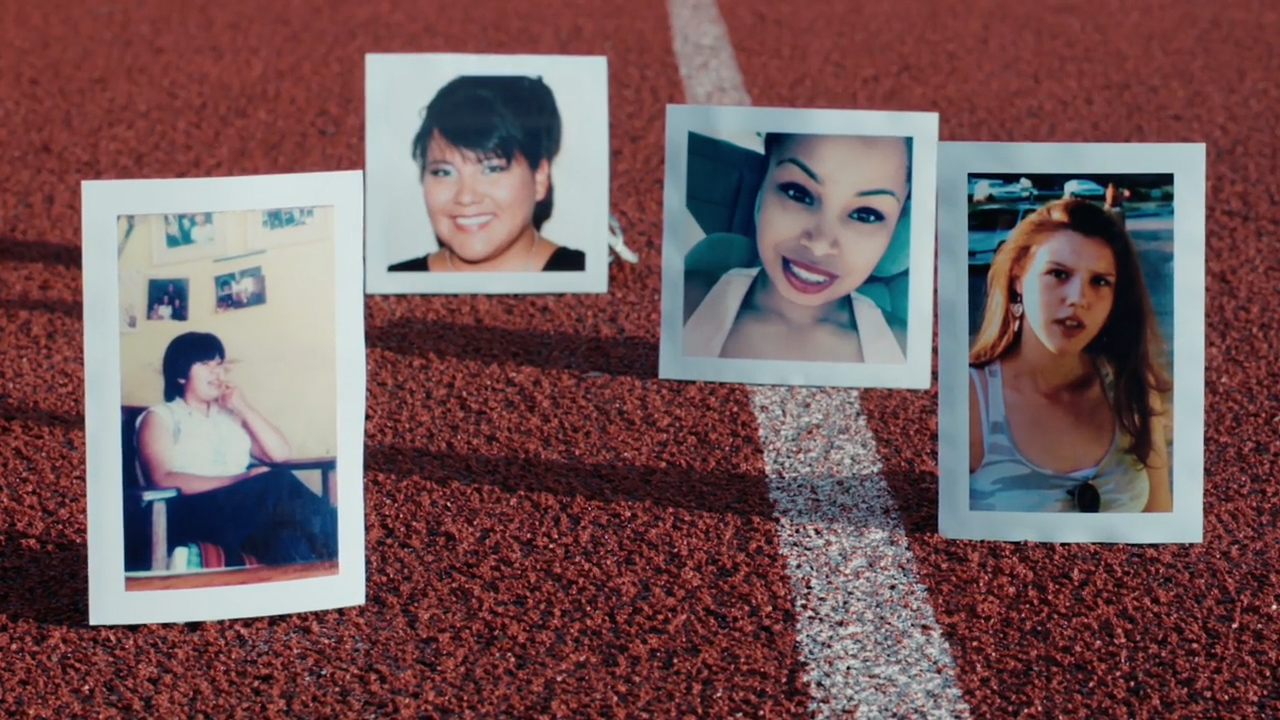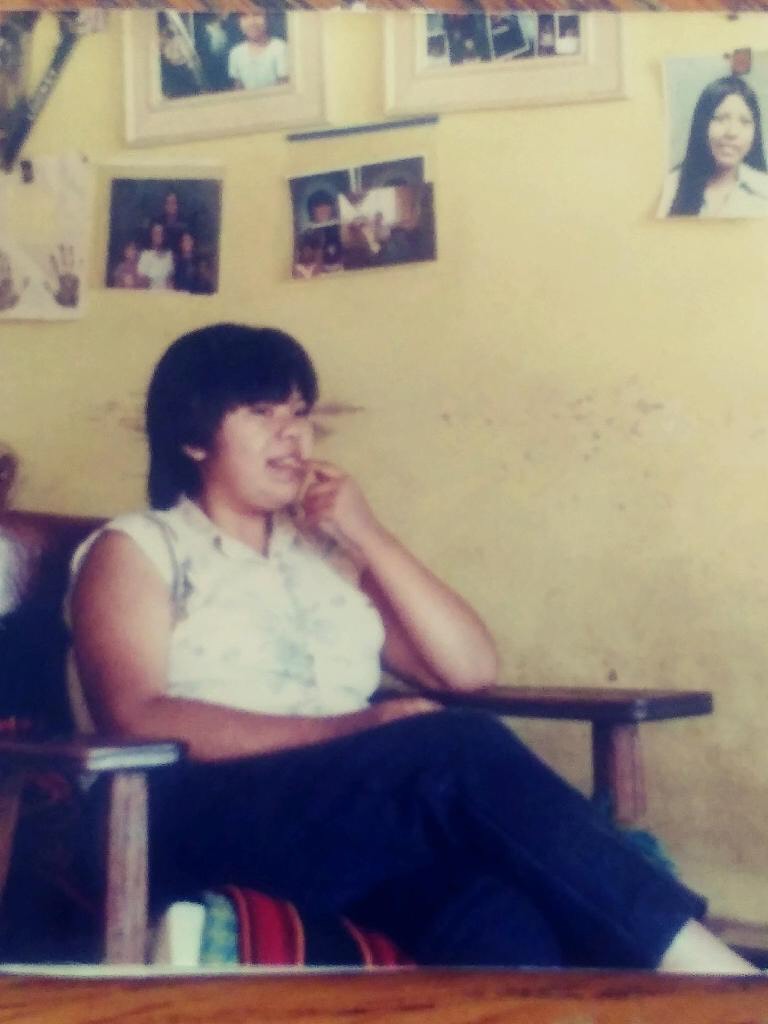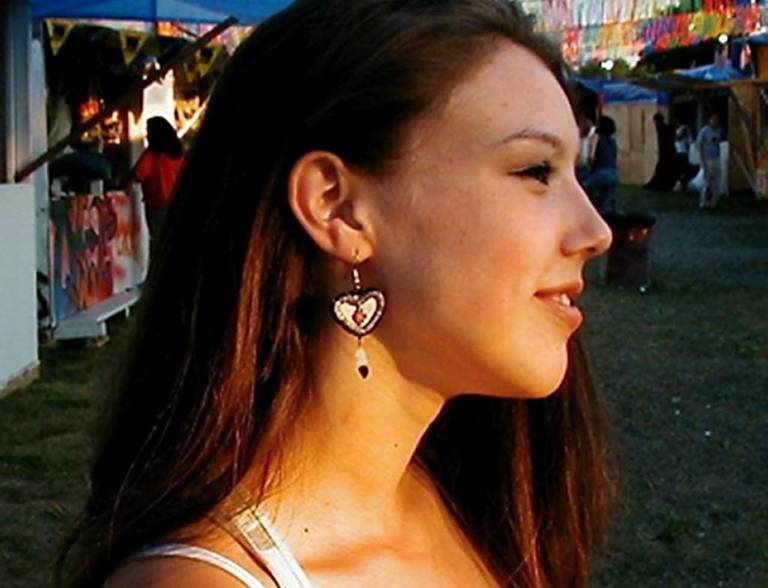 An image of missing and murdered Indigenous women
An image of missing and murdered Indigenous women Alice Looney, Renee Davis, Jacqueline Salyers, and Misty Upham were all found dead. In some cases, they went missing first. Law enforcement killed them in others. Each of them, along with the countless other missing and murdered Indigenous women across the U.S., are the reason Rosalie Fish runs with a red handprint across her face.
The University of Washington athlete uses the symbol to draw attention to the disproportionate violence against Native women and girls across North America as part of the Missing and Murdered Indigenous Women (MMIW) movement, the acronym for which Fish also paints down her leg on race day.
“Growing up…you begin to normalize Native women in your community going missing or being murdered or just being gone.” Fish, a member of the Cowlitz Tribe, grew up on the Muckleshoot Reservation near Auburn, Washington, and is personally familiar with the issue. “I didn’t learn about the MMIW movement, I learned that what was happening had a name.”
According to the Urban Indian Health Institute, homicide is the third leading cause of death for Native American and Alaskan Native women as of 2018. That rate is nearly three times higher than that of non-Hispanic white women, as stated in a National Congress of American Indians Policy Research Center Update the same year. In some parts of the country, that rate is almost 10 times the national average, and a 2016 National Justice Institute report found that over 80% of Native American women will experience violence in their lifetime.
Fish’s aunt was one of those women. After years of family stories about her aunt’s death, after years of muffled reactions to disappearances and a cacophony of racist ones to her team’s Native school uniform, Fish decided to combine the movement and track to get loud herself.
Athlete Jordan Marie Daniel inspired her to use running as a platform. Daniels ran the 2019 Boston Marathon with the red handprint across her face, too, and prayed for a different missing or murdered Indigenous woman during each mile. Fish decided to do something similar, dedicating each of four races at her final 2019 Eastern Washington University track meet to a different woman.
1600 meter – Alice Looney
Fish dedicated her first race, the 1600 meter, to her aunt, Alice Looney.
Looney, 38 and a member of the Yakama Nation, went missing on Aug. 16, 2004. Multiple people reported sightings of Looney with an unknown man soon after, but her family didn’t get answers to her disappearance until a hunter found her body on a small island in Status Creek on Nov. 30, 2005. Authorities listed her death as inconclusive, but suspected homicide.
A 2009 FBI report detailing the results of a two-year investigation into the deaths of 16 women on or near the Yakama Reservation where Looney was found, listed 10 of those 16 as homicide or probable homicide. Looney’s death was the only one labeled “inconclusive.”
Looney grew up the youngest of 11 siblings in Klickitat County. She attended Goldendale Elementary & Fort Apache Boarding School in White River, Arizona, and suffered bullying as a child and ongoing depression as a result.
“She didn’t have a hostile bone in her body, said sister Doris Strong as reported in the Yakima Herald Republic, “she was very sensitive.” That didn’t stop her from being resilient, though, as she demonstrated when she learned to walk again after a 1984 car accident.
Those who knew her say she loved spending time with her nieces and nephews and had found a connection to her heritage through traditional fishing and fish drying methods. Fish says she remembers stories her other aunts told about Looney, including her love of cooking, and especially of sharing that food with her family.
3200 meter – Renee Davis
“My 3200 was by far one of the hardest races I ran.” Fish says thinking about Renee Davis and her unborn son, Massi, took a mental toll. “It was eight laps of thinking about her and her family and praying for her peace and her rest.”
Davis was 23, a member of the Muckleshoot tribe, a teacher’s assistant at the Muckleshoot Headstart program, and soon-to-be mother of four when King County Sheriff’s Deputies killed her in her home on the Muckleshoot Reservation.
Deputies Timothy Lewis and Nicholas Pritchett responded to a suicide concern at Davis’ home on Oct. 21, 2016. Upon arrival, they got no response at the door, began entering through a window, asked one of her children present at the time (ages two and three) to open the door, and shot Davis as she lay in her bed less than one minute later. They reported Davis held an unloaded gun, the magazine in her other hand, and was largely unresponsive when they entered the room. Her children followed them to the bedroom and witnessed the event. Pritchett said he was familiar with Davis and the abuse she suffered at the hands of a significant other and that she had never caused problems when he’d reported to her home during those incidents.
King County agreed to pay a $1.5 settlement in Aug. 2021 in response to a civil rights lawsuit and wrongful death lawsuit filed by Davis’ family.
Davis grew up in and out of foster care with her sisters, who say she always focused on reconciliation and was a constant source of support to those around her. She connected to her heritage by hunting, fishing, and learning about Salish history and culture. At the time of her death, she was attending classes to get her associate degree in childhood development.
800 meter – Jacqueline Salyers
“By the time I got to the 800, it felt more so like my responsibility. All the nerves had gone away,” says Fish, “[I was] stepping up to the line and knowing I had a job to do…this was way bigger than how my legs felt or how tired I was. I need to represent [Salyers] with grace and honor, and I need to be humble about my actions.”
Jacqueline Salyers, 32, a member of the Puyallup tribe, was a mother of four and pregnant when police shot her in Tacoma on January 28, 2016, while attempting to arrest her boyfriend.
At the time, Washington state law required police to have shown “malicious intent” to be criminally responsible for using deadly force. The Salyers family led the movement to pass bill I-940, which would remove the malice provision and mandate police de-escalation training. It passed in 2018.
In an article in the South Seattle Emerald, Salyers’ mother, Lisa Earl, says she was “the most giving person, she’d give you the shirt off her back.”
400 meter – Misty Upham
When she got to her final race, Fish’s coach told her, “Remember why you’re doing this…I want you to run for them, and I don’t want anything left.”
Misty Upham, 32, was a member of the Blackfeet Tribe and an actor. She was most known for her roles in “August: Osage County,” “Django Unchained,” and “Frozen River,” which received multiple Academy Award nominations. Upham herself won best supporting actress at the American Indian Film Festival.
Upham went missing from the Muckleshoot Reservation on Oct. 5, 2014. Family and Muckleshoot tribal members found her body near the reservation on Oct. 16. Police labeled her death a suicide, but her family disagrees with their findings.
The BBC reported that Upham, who grew up in Montana, described herself as “painfully shy.” Despite that, friends and family say she was outspoken against mistreatment of Native Americans in the film industry and a passionate animal rights advocate.
After her death, animal rights organization PETA released a statement saying “The world will be a colder place without Misty’s warm heart, and she will be sorely missed at PETA. She was extremely kind and cared deeply about animals; constantly calling for protection for the bears suffering in roadside zoos on tribal land, a call we will carry forward in her honour.”
Progress
The MMIW movement has seen recent progress, both locally and nationwide. Seattle City Council passed resolution 31900, calling for the City of Seattle to create systems to protect women from indigenous communities from violence. The Savanna’s Act followed in 2020, requiring the Department of Justice to revise and develop policies to deal with missing and murdered Indigenous persons cases, and in 2021, Secretary of the Interior Deb Haaland of the Laguna Pueblo Tribe announced the formation of Missing and Murdered unit. Washington State House Bill 1725 became law in June of this year, enacting the nation’s first statewide alert system for missing Indigenous people.
Fish believes that progress is evidence that the platform she started building at that 2019 state championship (where she placed first in 800, 1600, 3200 meter finals) works. She transferred to the University of Washington in 2021, where she continues to run with the handprint on her face.
“Running with the paint changed my life…it changed running for me forever.”



